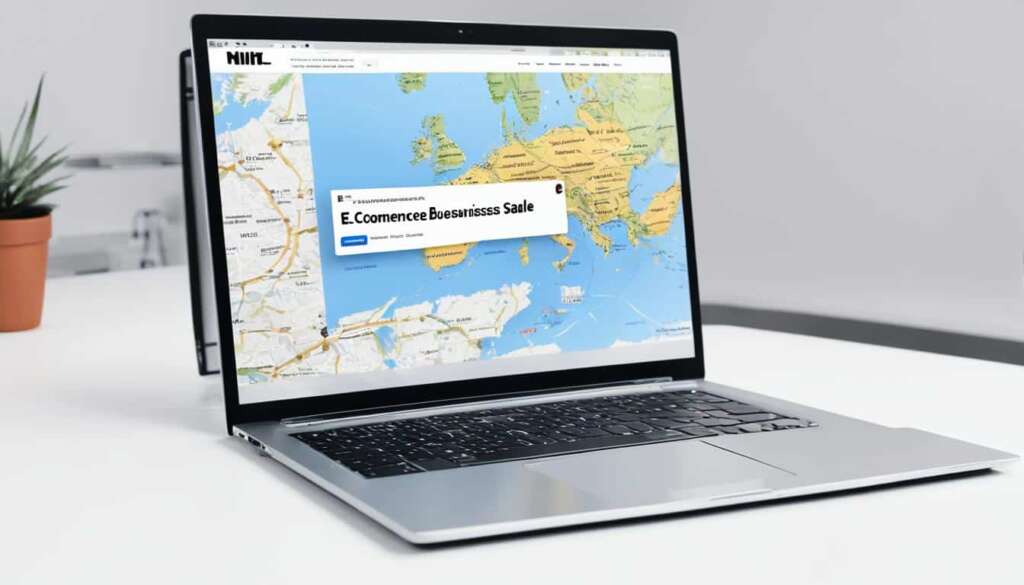Table of Contents
The e-commerce industry in the UK offers a wide range of opportunities for entrepreneurs looking to enter or expand in the online market.
With the growth of online shopping and the convenience it offers, buying an e-commerce business can be a profitable venture. Running an e-commerce business has advantages such as lower overhead costs compared to traditional retail businesses.
While physical space for warehousing and administration may still be necessary, the reduction in ‘physical’ overheads can lead to increased profitability. Staffing costs should also be carefully considered when running an e-commerce business.
There are numerous e-commerce businesses for sale in the UK, with various niches and industries available for potential buyers. Whether you are a budding entrepreneur or an established business looking to expand, the UK e-commerce market has options to suit every ambition and budget.
Advantages of Running an E-Commerce Business
Running an e-commerce business provides numerous advantages and benefits compared to traditional retail. Let’s explore some of the key advantages that make e-commerce an attractive option for entrepreneurs:
- Reduced Overhead Costs: One of the significant advantages of running an e-commerce business is the reduction in overhead costs. Unlike brick-and-mortar stores, e-commerce businesses don’t always require a physical retail premises. This eliminates the need for expensive rent and utilities, allowing businesses to allocate those funds towards other growth initiatives.
- Increased Customer Reach: E-commerce businesses have the potential to reach a larger customer base compared to traditional retail. With an online store, geographical boundaries are virtually eliminated, enabling businesses to target customers across regions, countries, or even globally. This wider audience increases the potential for sales and business growth.
- Lower Marketing Costs: Marketing and advertising costs can be significantly lower for e-commerce businesses compared to traditional retail. Online marketing channels such as social media, search engine optimization, and targeted advertising allow businesses to reach their ideal customers directly. This targeted approach helps optimize marketing spend and achieve higher returns on investment.
- Convenience and Accessibility: E-commerce businesses can operate 24/7, offering customers the convenience of shopping at any time. This accessibility increases sales opportunities as customers can browse and make purchases according to their schedules. Additionally, the ability to provide efficient shipping options enhances the overall shopping experience, encouraging customer loyalty and repeat purchases.
Overall, running an e-commerce business offers advantages such as reduced overhead costs, increased customer reach, lower marketing expenses, and enhanced convenience for customers. These benefits make e-commerce an appealing option for entrepreneurs looking to tap into the online retail market.
Profitable E-Commerce Niches in the UK
Discovering profitable e-commerce niches is crucial for success in the UK’s online market. By focusing on successful online industries, entrepreneurs can tap into lucrative opportunities for sustainable growth. Here are some of the top profitable e-commerce niches in the UK:
- Beauty and Health Products
- Second-Hand Goods
- Smart Home Technology
- Online Educational Courses
- Selling eBooks
These niches have consistently demonstrated profitability and growth in the e-commerce industry. The beauty and health products niche continue to thrive as consumers prioritize self-care and wellness. Second-hand goods present a sustainable and environmentally friendly option that resonates with the eco-conscious audience. Smart home technology caters to the increasing demand for convenience and digital connectivity in modern households. Online educational courses offer valuable knowledge and skill development, particularly in the digital age. Lastly, selling eBooks provides a convenient platform for authors and readers alike.
When exploring these niches, conducting thorough market research is essential. Evaluate the potential sustainability and profitability of each niche before starting or acquiring an e-commerce business. This research will help you identify profitable opportunities and understand consumer demand, ensuring your venture aligns with the successful online industries in the UK.
“In the ever-evolving e-commerce landscape, choosing the right niche is crucial. By focusing on profitable e-commerce niches in the UK, entrepreneurs can position themselves for long-term success in the competitive online market.”
Buying an E-Commerce Business in the UK
For entrepreneurs looking to enter or expand in the online market, buying an e-commerce business can be a strategic move. Numerous platforms such as Flippa offer curated listings of e-commerce businesses for sale, providing a convenient way to browse available options based on industry, revenue, and other factors.
Before making a purchase, it’s crucial to have a clear understanding of the financials and operations of the e-commerce business. This entails reviewing the website, inventory, and finances, as well as conducting a comprehensive business valuation to determine the potential net profit. By delving into the details, buyers can make informed decisions and mitigate risks.
“Buying an existing e-commerce business can save time and effort compared to starting from scratch. It allows entrepreneurs to benefit from an established customer base, supplier relationships, and operational systems,” says John Chapman, a successful e-commerce entrepreneur.
When evaluating an e-commerce business, it’s essential to assess its scalability and growth potential. Analyzing the current market trends, competition, and the business’s unique selling propositions can provide valuable insights into its future prospects. This information can help entrepreneurs determine whether the e-commerce business aligns with their long-term goals and aspirations.

Key Considerations When Buying an E-Commerce Business
When buying an e-commerce business, several key considerations should be kept in mind:
- Financial Health: Review the financial statements, cash flow, and profitability of the business to assess its financial health and sustainability.
- Market Analysis: Evaluate the target market, customer demographics, and industry trends to ensure the business operates in a viable and growing niche.
- Supplier Relationships: Assess the relationships with suppliers, including product sourcing and availability, to ensure a smooth transition of operations.
- Technological Infrastructure: Evaluate the website’s design, user experience, and technical capabilities to determine if any upgrades or enhancements are required.
- Legal Considerations: Conduct due diligence on legal aspects such as contracts, intellectual property rights, and potential liabilities.
By thoroughly considering these factors and conducting a comprehensive assessment, entrepreneurs can make well-informed decisions when acquiring e-commerce businesses.
Setting Up or Starting an E-Commerce Business
Setting up an e-commerce business requires careful planning and execution. Entrepreneurs can choose from various platforms, such as Shopify, WooCommerce, SquareSpace, and Wix, to build their online store. Each platform offers different features and capabilities, so it’s important to choose the one that best suits the needs and goals of the business.
Additionally, digital marketing plays a vital role in the success of an e-commerce business. Learning SEO or partnering with a marketing agency can help drive traffic and increase sales. It’s essential to provide fast shipping and competitive prices to attract and retain customers in the highly competitive e-commerce market.
“Setting up an e-commerce business is much like constructing a brick-and-mortar store; it requires a solid foundation and strategic planning to ensure success.” – Jane Smith, E-commerce Expert
When choosing an e-commerce platform, consider factors such as ease of use, built-in features, design options, and scalability. These platforms provide templates and customization options to create a visually appealing and user-friendly online store. It’s crucial to optimize the website’s layout for mobile devices as mobile commerce continues to grow.
In addition to building the website, entrepreneurs should focus on digital marketing strategies to drive traffic and attract potential customers. Search engine optimization (SEO), social media marketing, email campaigns, and content creation are essential for increasing visibility and generating sales. Understanding your target audience and their online behavior is key to developing effective marketing campaigns.
To stand out in the competitive e-commerce landscape, businesses must provide exceptional customer service. This includes offering fast and reliable shipping options, easy returns or exchanges, and prompt customer support. Personalization and customization options can also enhance the customer experience and increase customer loyalty.
Building an E-Commerce Website: Comparison of Popular Platforms
| E-Commerce Platform | Key Features | Pricing | Pros | Cons |
|---|---|---|---|---|
| Shopify | Easy-to-use interface, extensive app integration, mobile-friendly design | Starting from £22/month | Great for beginners, scalable, excellent customer support | Additional transaction fees, limited customization options for advanced users |
| WooCommerce | Flexible and customizable, seamless integration with WordPress, free plugins available | Free plugin, hosting and domain expenses not included | Unlimited customization options, cost-effective for small businesses | Requires WordPress knowledge, may need additional plugins for certain features |
| SquareSpace | Elegant and modern templates, built-in SEO tools, integrated email marketing | Starting from £18/month | Intuitive user interface, visually appealing designs, all-in-one platform | Limited third-party integrations, transaction fees on lower plans |
| Wix | Drag-and-drop website builder, AI-powered design assistance, secure online payments | Starting from £13/month | User-friendly interface, beginner-friendly, extensive design options | Less flexibility for advanced users, limited scalability |
Growing and Scaling an E-Commerce Business
Once an e-commerce business is established, the focus shifts to growth and scalability. To ensure long-term success, it’s crucial to implement strategies that expand the brand’s presence, reach new customers, and maximize revenue. Here are some key steps to consider when growing and scaling your e-commerce business:
1. Expand the Product Range
One effective way to attract and retain customers is by offering a diverse range of products. Conduct market research to identify popular trends, customer demands, and gaps in the market. By expanding your product range, you can cater to a wider audience and increase sales potential.
2. Target New Customer Segments
Identifying and targeting new customer segments is essential for expanding your customer base. Conduct market segmentation analysis to understand the needs and preferences of different customer groups. Develop targeted marketing campaigns tailored to each segment to attract new customers and drive sales.
3. Explore New Marketing Channels
While your existing marketing channels might be generating satisfactory results, exploring new channels can unlock further growth opportunities. Consider utilizing social media advertising, influencer marketing, or content marketing to expand your brand’s reach and engage with potential customers.
4. Invest in Reliable Servers and Ensure Website Security
A seamless online shopping experience is crucial for customer satisfaction and retention. Investing in reliable servers and robust website security measures is essential to ensure fast loading times and protect customer data. Slow-loading websites and security breaches can result in a negative user experience and harm your brand reputation.
5. Consider Partnerships and Collaborations
Collaborating with complementary businesses can help expand your brand’s visibility and reach a broader customer base. Consider forming partnerships or collaborations with influencers, bloggers, or other brands in your industry. This can lead to cross-promotion, access to new audiences, and increased brand awareness.
6. Sell on Larger Marketplaces
Expanding your sales channels by selling on larger marketplaces, such as Amazon or eBay, can significantly increase your brand’s visibility. These platforms provide access to a large customer base and offer built-in marketing and logistical support. However, it’s important to weigh the pros and cons and consider the impact on your brand identity and profit margins.
7. Regularly Review and Analyze Data
Continuously reviewing and analyzing data is crucial for making informed business decisions and optimizing your e-commerce operations. Monitor sales data, customer behavior, website analytics, and marketing metrics to gain valuable insights. These insights can help identify areas for improvement, fine-tune marketing strategies, and drive operational efficiencies.

By implementing these strategies and continuously adapting to market trends, you can drive the growth and scalability of your e-commerce business. Remember, staying agile and responsive to changing customer demands is key to long-term success.
Conclusion
The e-commerce industry in the UK presents a plethora of promising opportunities for entrepreneurs seeking to venture into or expand their presence in the online market. The reduced overhead costs and the potential for global reach make e-commerce businesses highly profitable ventures. Whether starting from scratch or acquiring an existing business, meticulous planning and flawless execution are vital for achieving success.
Choosing the right niche, platform, and digital marketing strategies are critical factors in establishing a sustainable and lucrative e-commerce business. Entrepreneurs need to stay updated with industry trends and continuously optimize their operations to thrive in the fiercely competitive e-commerce landscape.
Investing time in comprehensive market research and analyzing customer behavior can provide valuable insights for strategic decision-making and optimization. Additionally, maintaining a customer-centric approach, offering competitive prices, and ensuring fast shipping will help attract and retain customers in the highly saturated e-commerce market.
By focusing on these key success factors and leveraging the vast potential of the UK e-commerce industry, entrepreneurs can build thriving businesses that capitalize on the ever-growing online consumer market.
FAQ
What are the advantages of running an e-commerce business?
Running an e-commerce business offers advantages such as lower overhead costs, a larger customer reach, and the convenience of shopping 24/7.
What are some profitable e-commerce niches in the UK?
Some profitable e-commerce niches in the UK include beauty and health products, second-hand goods, smart home technology, online educational courses, and selling eBooks.
How can I buy an e-commerce business in the UK?
You can buy an e-commerce business in the UK by using platforms such as Flippa to browse curated listings. It’s important to understand the financials and operations before making a purchase.
How do I set up an e-commerce business in the UK?
To set up an e-commerce business in the UK, you can choose from platforms such as Shopify, WooCommerce, SquareSpace, or Wix. It’s also important to focus on digital marketing to drive traffic and increase sales.
How can I grow and scale my e-commerce business?
To grow and scale your e-commerce business, consider expanding your product range, targeting new customer segments, exploring new marketing channels, and ensuring a seamless shopping experience with reliable servers and website security.













